Espionage claim launched
WH Bowker storage boost
ballot under way
OPERATORS INSIDE
LIFE EXTENSION: Tankers used by the military to refuel aircraft such as Typhoon and Hawk jets have been refurbished to enable them to be used for another 15 years. The large capacity aircraft refueller life extension project (LCAR LEP) is upgrading 80 tankers to improve deployability, availability and flexibility. The project is a collaboration between Defence Equipment & Support (DE&S), the Royal Air Force and Terberg DTS UK, who have a number of key subcontractors including MAN Truck & Bus UK and Tasca Tankers.
Air Commodore Simon Young, DE&S’ head of air systems, equipment and training, said: “The large capacity aircraft refueller is a vital defence-enabling capability, providing the backbone of our aircraft refuelling fleet. These vehicles are out there every day ensuring our aircraft have the fuel they need to deliver their tasks, whether that be securing the skies above the UK, transporting people and equipment around the world or delivering on operations. Without this capability, UK defence aviation simply doesn’t happen.” The 20,000l-capacity LCARs supply the bulk of the fuel for RAF, Royal Navy and British Army aircraft.
BT and Royal Mail win damages from DAF in first ruling of long-running price collusion claim
Two UK operators win millions in landmark truck cartel ruling
By Chris Tindall
DAF Trucks must pay BT and Royal Mail millions of pounds in damages after the Competition Appeal Tribunal (CAT) found that the manufacturer had overcharged the companies whilst involved in an illegal pricing cartel.

The landmark ruling is the first judgment by a UK court concerning a European truck builder accused of price-fixing between 1997 and 2011.
In 2016, the European Commission determined that DAF, MAN, Daimler, Iveco and Volvo/Renault had colluded on pricing and gross price increases for medium and heavy trucks in the European Economic Area.
Both Royal Mail and BT argued that they had purchased or leased

large volumes of trucks from DAF during the infringement period and that they had been overcharged as a result of the manufacturer’s infringement.

They claimed damages relating to the overcharging plus consequential losses.
The tribunal held that the claimants had been overcharged and that the overcharge for which DAF was liable was 5% for both companies on their value of commerce, which was calculated
as £260,597,683 for Royal Mail and £44,961,617 for BT.
The tribunal said mitigation put forward by DAF, including its claim that if the price of a new truck increased as a result of an overcharge, then the price of used vehicles sold by the claimants would also increase and so that benefit should be offset, all failed.
The CAT ordered the parties to come to a deal on compensation, otherwise the case would return to court.
Steven Meyerhoff, director of law firm Backhouse Jones, which is representing the RHA in its class action claim against truck manufacturers on behalf of more than 17,000 hauliers, described the result as a “positive outcome”.
Meyerhoff said the RHA’s claim was different to the claimants, in that they were both large corporate buyers and “within the RHA class there are operators of all shapes and sizes and most of them have far less bargaining power”.
He added: “This is the first judgment the UK courts have given on whether or not the cartel impacted the prices, and the tribunal found it did. They found there was a 5% overcharge.”
DAF Trucks declined to comment.
Sharp ■ Informed ■ Challenging 20.2.23 DX Group p3 FCL Event Logistics p4 JW Suckling Transport p5 McBurney Transport Group ����������������������������p3 Menzies Distribution �������������������������������������� p4 Nicholls Transport p4 STR Logistics p3 Tuffnells Parcels Express p3 Warrens Group p4 WH Bowker p4
Tuffnells takes DX to court p3
Food-grade DC purchased p4
p5 NEWS INSIDE Road Transport Expo p6 Focus: regulation p8 Viewpoint: AI p10 Electric tippers p12 Interview: Graham Leitch p16
Strike
Tanker drivers seek pay rise



B2C pallet volumes still growing, says APN
A new report by the Association of Pallet Networks (APN) has shown that despite the fluctuations of the past four years, network volumes during 2022 continued to grow in real terms.
Service levels have remained strong at 96%, it said, and trailer utilisation remains well above the DfT’s average for the industry.
“The major take-away from 2022 is that B2C growth has stayed high and was not a transient feature of the pandemic,” said APN chairman Paul Sanders. “At
16% of all pallet volume, this is now being driven by the increasing popularity of e-commerce for large household and manufactured supplies.”

The APN also focused on highlighting available careers, developed its sustainability programme and continued the work of its health and safety steering group.
The networks lowered their accident rate to 0.46 per 100,000 pallets delivered in 2022, the fifth reduction in five years.
Claim of corporate espionage filed in High Court demands damages and return of lost profits
Tuffnells launches legal action over DX ‘spying’
Tuffnells Parcels Express is taking legal action against DX Group in relation to alleged corporate espionage, according to a claim filed in the High Court.
The claim, revealed in a report in the Sunday Times, alleges that three DX Group employees conspired to obtain daily customer service reports from Tuffnells in October 2020.
Sheffield-based Tuffnells is seeking damages and demanding DX account for all profits arising from its use of confidential data.

McBurney goes for solar battery boost
McBurney Transport Group is fitting 146 new refrigerated trailers with solar panels from Genie Insights, following a one-year trial.
The 50W panels keep the fridge batteries charged to prevent breakdowns.
The group’s decision to fit solar panels was supported by data gleaned from its asset management system.
Sammy Hamill, McBurney Transport Group fleet transport manager, said: “We were surprised to see how such a simple solution could provide the answer to the battery issues increasingly common in the refrigerated transport industry.”
DX Group confirmed that it has “received a claim from Tuffnells Parcels Express in relation to confidential competitor information being obtained by DX in the past.
“Matters referred to in the claim were subject to a corporate govern-
ance inquiry and investigation by DX, the conclusions of which were reported by the company in an announcement made on 20 September 2022. The group intends to defend its position robustly and will respond to the claim in due course.”
The investigation also found that DX had failed to take sufficient disciplinary action against employees who had offered a bribe for the confidential competitor information.
DX chief executive and former Tuffnells CEO Lloyd Dunn
stepped down in September last year, with DX chairman Ron Series retiring just weeks later.
Series’ departure followed shareholders criticism of his handling of the inquiry, which resulted in the resignation of Grant Thornton, the group’s auditors, in February last year.
Series has since been replaced by Mark Hammond, a former chairman of Tuffnells Parcels Express, whilst Dunn was replaced by Paul Ibbetson, MD of DX Freight, who previously worked at Tuffnells.
STR Logistics goes under after 20 years
Exeter haulier and Palletways member STR Logistics has entered administration.
The company, which employs around 80 staff and holds an operator licence authorising 20 HGVs and 12 trailers running out of its Alphington base, appointed administrators from insolvency firm SFP on 31 January.
STR Logistics was incorporated over 20 years ago and provided transport and logistics services including two-man home deliveries, pallet distribution, trunking,
secure freight handling and first/last mile operations. In November 2021, it joined Palletways and had taken on distribution services across the ‘English Riviera’, as well as Teignmouth and Newton Abbott. n Burton-on-the-Wolds haulier Eclipse Distribution Solutions collapsed because it failed to convince the traffic commissioners it had sufficient finances for its fleet size, resulting in the revocation of its licence, according to the administrator. The company ceased trading on 28 October 2022 with the loss of 41 jobs.
Logistics UK adds industry trio to strengthen board
Logistics UK has strengthened its board with the appointment of three new directors who hold key posts at Kinaxia, DHL Supply Chain and Bis Henderson.
Simon Hobbs, Louisa Hosegood and Gavin Murdoch join the organisation’s board with a brief
to help develop the business, aid the logistics sector’s postpandemic recovery and build ties with government and other stakeolders.
Simon Hobbs is chief executive of Kinaxia Logistics, which currently operates more than 850
vehicles and 2.7 million sq ft of warehousing nationwide.
Gavin Murdoch is MD of network transport solutions at DHL Supply Chain, while Louisa Hosegood is strategy and transformation director of Bis Henderson Group.
motortransport.co.uk News MotorTransport 3 20.2.23
Photo: Shutterstock
Firm ends long search for storage with deal for huge distribution centre WH Bowker acquires Doncaster warehouse
By Carol Millett
Preston-based WH Bowker has purchased a new warehousing facility in Thorne, Doncaster as part of its expansion plans. The family firm, which specialises in food, pharmaceutical,
and chemical logistics, said the 165,000sq ft facility will boost its warehousing estate – which spans 12 distribution centres – to over 1.5 million sq ft of storage capacity. The company also operates a fleet of 225 trucks and 450 trailers.
Warrens grabs new DIRFT units
Warrens Group has snapped up two new units at Daventry International Rail Freight Terminal (DIRFT) from logistics real estate developer Prologis, as part of its plans to drive growth.
The new food-grade distribution centre will have the capacity to store over 31,000 pallets, has 16 dock levellers and four floor level doors. When fully operational, it is estimated the site will employ 50 people, including management, warehouse operatives and HGV drivers.
Bill Bowker, WH Bowker director, said: “Our current warehousing estate has been operating at close to full capacity for some time.
“We have been looking at various options to increase our storage capacity and we’re now pleased to be in a position to provide new and existing customers the additional space.”
Nicholls reaps green benefits of LNG fleet
Sittingbourne-based Nicholls Transport has cut its greenhouse gas emissions (GHG) by almost 200% in just three months by running an LNG-powered fleet.
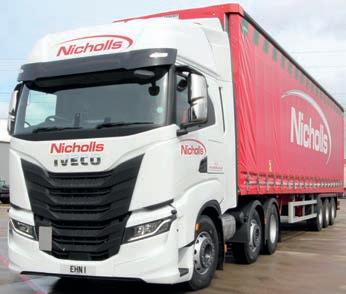
The Kent family business provides bespoke distribution and haulage services across the UK, Northern France, Belgium and Holland and has a client base including many blue chip companies.
The firm operates a fleet of 115 trucks, 29 of which are powered by bio-LNG derived from dry manure,
provided by Gasrec. According to the company’s latest Renewable Fuel Declaration, produced by the Zemo Partnership, in the three months to September 2022 the trucks achieved an A+ rating and GHG emissions savings of 191% compared to their diesel-powered equivalents.
Rob Gearing, Nicholls Transport head of commercial and business development, told MT: “This possibly makes us one of the greenest hauliers in the UK running LNG trucks.”
Baked goods warehousing and logistics provider Warrens Group is the preferred primary haulier for bread and cake distribution for Tesco and Sainsbury’s and has been in a joint venture with Culina since 2018.
The two build-to-suit units will provide Warrens with a combined 514,000sq ft of logistics real estate and sees the firm join Culina subsidiary Eddie Stobart at DIRFT, as well as other companies including Tesco and Sainsbury’s.
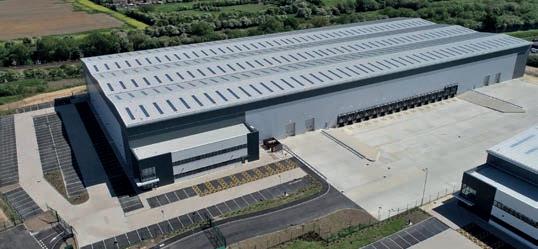
Both of the leased units are BREEAM-rated ‘Excellent’ and have delivered a combined £5.4m in social value, partly through the number of job opportunities created onsite.
Menzies secures five-year deal with building giant Weber Saint-Gobain
Menzies Distribution has won a five-year contract with Weber, the UK arm of building materials giant Saint-Gobain.
applied and their main uses.
The second manufacturing site is in Telford, Shropshire.
PAINT IT BLACK: Events transport haulier FCL Event Logistics has purchased three Dry Liners from Krone, one with a specific paint job. Martin Cowie, logistics manager at FCL, said: “We painted one of our tractor units in a very distinctive metallic black for a client. When the contract came to an end the truck still had relatively low mileage, so we wanted to keep it in the fleet but needed a trailer to match it. Krone came up with the goods.” The Dry Liners it bought are based on Krone’s universal modular chassis, featuring an optimised welded assembly and robust bulkhead connection. For increased stability, the chassis is equipped with a raised front rail and the rear lights are mounted on the diagonally reinforced, ramp-compatible rear with protection.

Menzies began managing the company’s UK deliveries, including pallets and full loads, from its manufacturing sites to domestic customers at the beginning of this year.
Ahead of commencing operations, four Menzies team members attended the Weber Training Academy at the company’s Flitwick site in Bedfordshire, providing an opportunity to learn more about Weber products, how they are
Menzies is delivering render, tile grout and adhesive to national builders’ merchants and direct to construction sites, using an initial core fleet of seven vehicles.
The fleet, which will be fitted with new technology allowing electronic proof of delivery and real-time order visibility, will be increased in line with expected peak activity over the summer.
Additional team members have been recruited as a result of the contract, including office staff, planners and drivers.
News 4 MotorTransport 20.2.23
SAGA moves to snap up Sparshatt Truck & Van
Kent-based Sparshatt Truck & Van has been acquired by SAGA Mercedes-Benz in a move signalling the expansion of the French dealership group into the UK market.

Sparshatt Truck & Van employs more than 230 people across its headquarters in Sittingbourne and also has depots in Ashford, Dartford and Tonbridge, including a dedicated body shop.
SAGA Mercedes-Benz already operates 14 Mercedes-Benz Truck dealerships and
15 Mercedes-Benz Van outlets across France, Belgium and Switzerland.
It is owned by parent company RCM, which is based in La Roche-sur-Yon in the Vendee region of France and boasts a portfolio of 118 sites employing 2,750 staff. The purchase, for an undisclosed sum, will see Sparshatt continue to represent Mercedes-Benz Trucks and MercedesBenz Vans, under its existing name, with the company promising no interruption of service to customers or changes of staff. Previous owners, brothers Paul and Steve Rooney, are remaining in post to manage the dealer’s four sites.
JW Suckling Transport drivers threaten strike in fight for wage parity
Pay row could hit Jet fuel supplies
 By Carol Millett
By Carol Millett
Jet garages across the UK are facing fuel shortages this spring as JW Suckling Transport tanker drivers ballot for industrial action in a long-standing pay dispute.
The 30-plus drivers, who are members of Unite, are based at depots in Essex, West London and Grangemouth. The drivers undertake work as part of the Phillips 66 contract, which supplies fuel to Jet Garages.
Unite said that despite extensive negotiations, JW Suckling Transport has refused to increase the rates of pay of drivers on the contract so that they are compa-
Traffic commissioner Nick Denton has warned that skip and grab hire firms using restricted licences to transport waste must upgrade to a standard national licence or risk having their licences revoked.
The clampdown follows a recent public inquiry in Cambridge over the business activities of Leicester-based Wigston Skip Hire. The firm tried to apply for a restricted licence so it could hire out skips and then transport the waste to
Farmers opt for Fruehauf tippers
Co-operative business Openfield is taking delivery of 36 sloper smoothsider tippers from Fruehauf as part of its fleet expansion plans.
The organisation, which is owned by around 4,000 British farmers, sells approximately 17% of the UK marketed grain every year to some of the largest food and drink brands, as well as being one of Britain’s largest grain exporters.
rable with drivers employed by other hauliers on the same contract. It claims that the drivers are paid over £5 less an hour than other drivers for undertaking the same work.
The ballot for industrial action opened on Thursday 9 February
other companies’ waste transfer stations.
Wigston’s owner James March argued that all skip hire businesses in his area were operating under a restricted licence.
The company’s transport consultant claimed “requiring Mr March to apply for a standard national licence would put him at a competitive disadvantage”. However, Denton refused the application and said it fell foul of the licensing requirements.
and closes on Thursday 9 March. If the workers vote to go on strike then industrial action could begin before the end of next month. The strike action would affect fuel supplies to Jet Garages across Scotland and from Southampton to Norwich.
Openfield is also a national fertiliser distributor and manufactures and delivers seed to farmers. It started receiving the 72cu m trailers towards the end of 2022 at its Lincolnshire headquarters.
Further new tippers are due for delivery every month through to July, joining a mixed fleet which has grown by more than 40% as the farmer-owned co-operative expands its grain marketing and input deliveries business.
Hireco engages ‘industry heavy hitter’
Contract hire and rental specialist Hireco has appointed Jason Chipchase as UK contracts manager.
He joins the Purfleet-based company after more than 17 years with Krone Trailers in area sales manager positions.
His experience also includes sales and warehousing roles with Gray & Adams and Zebra Technologies.
Commented Kelly Finnegan, Hireco brand and marketing lead: “Signing this industry heavy hitter into the team shows the intention and ambitions of Hireco and gives Jason the opportunity to flex his industry muscle.”

motortransport.co.uk MotorTransport 5 20.2.23
‘Upgrade licence or lose it,’ warns TC
Photo: Shutterstock
The must-attend event for anyone involved in road transport is back – and it means business
Bigger and better in 2023
WORDS FROM EXHIBITORS IN 2022
■ “The buzz on the first day from visitors and exhibitors was contagious. At last, a proper truck show!” Edward Barrie, SMUK
■ “For EQUANS, the event was a fantastic opportunity for us to exchange knowledge and ideas about green mobility with the commercial vehicle industry. We had many insightful, positive conversations with partners and potential customers, and built invaluable relationships with other exhibitors over the few days.”
Ella Gibbs, EQUANS
■ “Road Transport Expo was a great event – it was a brilliant place to network with both potential clients and peers within the industry and great fun for anyone with an interest in trucks.”
 Kjell Anderton, Fleet Focus
By Hayley Tayler
Kjell Anderton, Fleet Focus
By Hayley Tayler
Visitors heading to the Road Transport Expo (RTX) this summer had best be wearing their comfy boots, with more than 200 exhibitors to explore at the bumper trade show.




Taking place from 28-30 June at NAEC Stoneleigh, RTX is back for its second year after a stonking debut in 2022 and promises to be bigger and better, whilst staying aligned with its “all about the truck” ethos.
It is the only UK trade show to feature all seven major truck OEMs – DAF, Iveco, MAN, Mercedes-Benz, Renault, Scania and Volvo – so visitors will be able to find everything they need for their fleet in one place.

To make the most of your day at RTX, why not take a browse on roadtransportexpo.co.uk to help you decide which stands to put on your ‘must visit’ list. You can filter by a simple A-Z search of company names or by product type.
Categories include products ranging from alternatively fuelled vehicles through to workshop/ weighing equipment and every-
RIDE & DRIVE
thing in between that you might need to kit out your company fleet.
There will also be a wide range of exhibitors showcasing their expertise in non-product-related areas such as training, recruitment, insurance and law.
To help visitors navigate on the day, there will be plenty of clear signage, large maps, a dedicated team of show-makers around the venue, and even a set of electric buggies to whizz you from one outside area to another.
For those preferring to use their phones to find their way around,
a dedicated RTX app will be available to download. This will also keep you in the loop about any live product talks or demonstrations taking place on stands.
“We have had terrific engagement with exhibitors about taking part in this year’s RTX,” says events sales director Emma Tyrer. “Many of them enjoyed a successful show last year and are keen to return, plus we have also had lots of new enquiries for businesses that heard about RTX after its debut and are keen to join us for the first time.
“It really is going to be the
If you hold a valid HGV licence and fancy getting behind the wheel of one of the latest diesel or alternatively fuelled trucks, then RTX is the show for you. We will, once again, be creating a dedicated route for visitors to try out vehicles on the day of their visit. Register your interest online when booking your show ticket and we will keep you up to date on how to take part. And it’s no problem if you don’t want to drive yourself, there will also be a team of professional drivers on hand to take visitors out for a spin to enjoy the driving experience from the comfort of the passenger seat.
perfect one-stop-shop for all things truck related and a brilliant day out for anyone in the business of operating an HGV fleet. We can’t wait to throw open the gates this summer and welcome visitors to the Road Transport Expo 2023 experience.”
Last year’s visitors were delighted with the wide range of exhibitors taking part in RTX, with 92% rating the number of stands to explore as ‘excellent/good’ and a whopping 95% rating the calibre of those companies as ‘excellent/good’.
If you have attended before, then we would love to see you back at NAEC Stoneleigh this June, and if you are new to RTX then please do come and along and join the buzz, it’s completely free to attend.
■ Register for your free place at roadtransportexpo.co.uk

motortransport.co.uk Road
Expo 6 MotorTransport 20.2.23
Transport
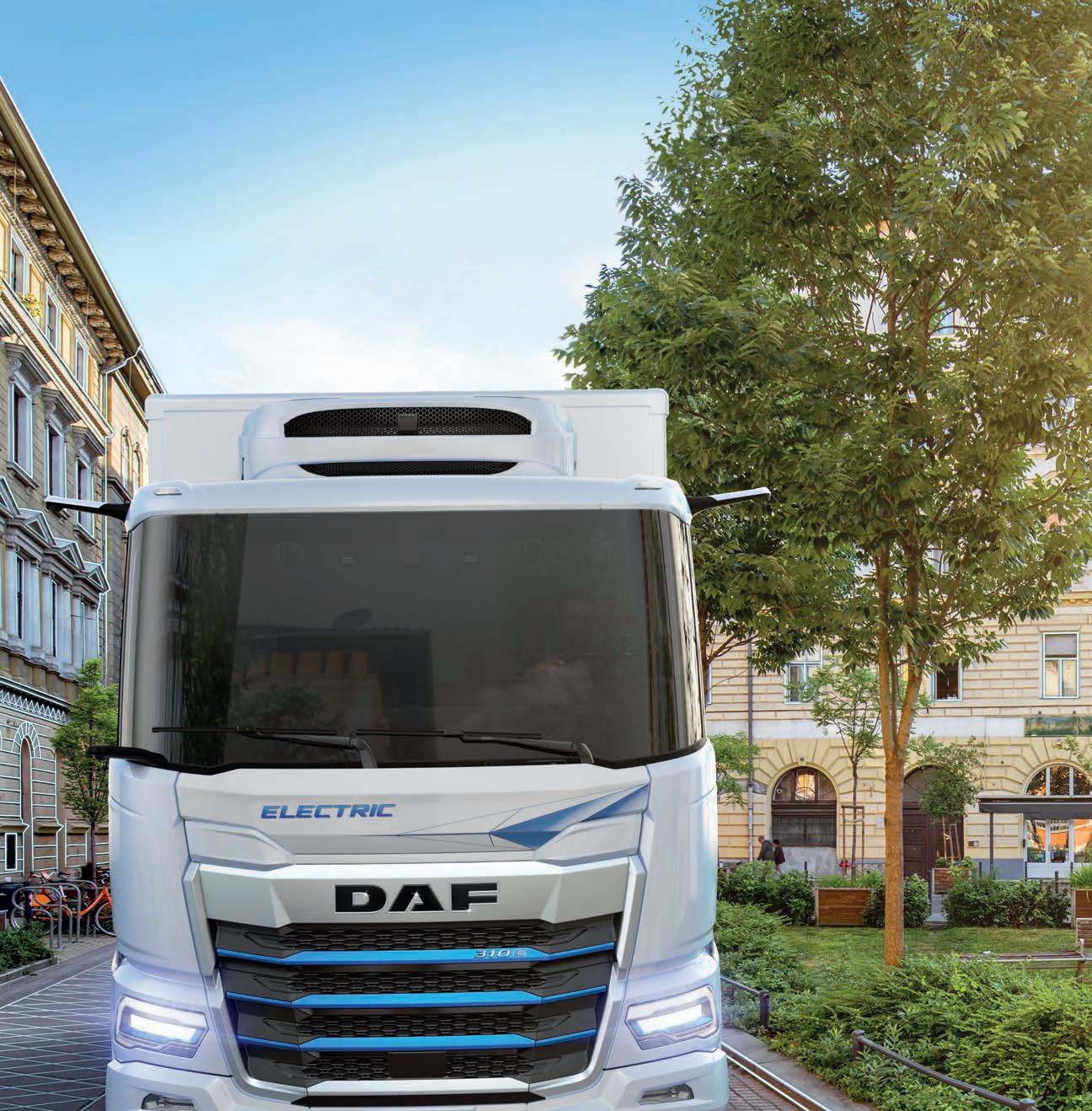


















It’s surely time for a proper review and a consultation with those who pay for the service
What price operator licensing?
It’s that time again – write another article hopefully of interest to operators and their customers who expect 24/7 delivery of all manner of products in this post-Covid world.



It’s a brave writer who, in the current economic climate, suggests fees being increased – so why am I doing it?
In a former role, I asked the DfT to consider two areas for review – the price of operator licences and the need for licences to be held in each of the traffic areas (being an old fogey I still call them these even though they were formally abolished a few years ago). It’s not for me to say what their response was – suffice to say we haven’t seen any changes and are unlikely to any time soon.
Is it therefore time for a licence fee review? We are all familiar with the saying “You get what you pay for” and I was struck by a recent comment from an indus-
try expert asking if operator licensing really is the Cinderella service of regulators.
When speaking to operators I regularly ask for their views on a licence fee review and they generally all say the same: “Change the fees so they are based on the number of vehicles”. They also all say, regardless of size, that they will happily pay more for a better service. I agree and hope readers will as well.
Counting the cost

Let’s put it into context. To register as a chiropractor costs £750 for the initial fee with an annual retention fee of £800 and to register as a taxi driver and get a licence for one vehicle for three years costs £254 with a three-yearly renewal fee of £254. Contrast this with the fee to apply for a goods operator licence of £257 and an issue fee of £401. It costs £658 to obtain a licence to operate, whether you are running
one vehicle or 1,000. And that’s the issue. The work done by the staff in the Central Licensing Office will be far more for the 1,000-vehicle operator than it will be for the one-vehicle operator. In effect, the one-vehicle operator is subsidising the 1,000-vehicle operator. Is that right or fair? I suggest not.
As the fees pay for the service operators receive, it’s no surprise the staff who provide these services are disappearing under a sea of emails, new licence applications, variation applications, change of transport manager applications, and any other number of applications that the commercial vehicle sector needs dealing with as quickly as possible. To rub salt into the wound, many applications don’t even attract a fee, so effectively the work is done by the staff for free. Is this unsustainable and unacceptable? Discuss!
Contrast this with the Environment Agency, which has
a discretionary service that provides formal definition of waste opinions, where customers pay an initial fee of £750 when they submit a request for a definition of waste opinion. This is equivalent to six hours work at £125 per hour. I am not suggesting the OTC adopts this – that is for others to discuss and decide, but I am saying it’s time for a proper review and a consultation with those who pay for the service.
So come on DfT – help the transport sector to get the first class service it deserves. After all, the sector gives GB plc a first-class service, so shouldn’t it receive one as well?

Next time I look forward to writing about whether in the third decade of the 21st century having eight operator licences for one GB operation is necessary – but that is another whole can of worms!
■ Beverley Bell CBE, director, Beverley Bell Consulting

motortransport.co.uk Focus: regulation 8 MotorTransport 20.2.23
E ectively E ciently Easily Communicate with drivers All vehicle types For more information or to book a demo visit thedriverhandbook.co.uk Email: enquiries@thedriverhandbook.co.uk

Pay parity edging closer
News that JW Suckling tanker drivers are joining colleagues at ArrowXL in threatening strike action over pay is significant in that it is so unusual these days. Unlike train drivers who have been taking industrial action for months in support of their unspecified pay claim, truck drivers seem relatively happy with their lot.
This is of course because many received pay rises of between 15% and 20% last year as the HGV driver shortage reached crisis levels and a long overdue correction in wages had to happen.
Rather than going on strike, large numbers of HGV drivers, especially those from Eastern Europe, voted with their feet and quit full-time driving after the Brexit vote. Coupled with a hiatus in truck driving tests during the pandemic, the shortfall of drivers was put at anywhere up to 60,000 – around a quarter of the workforce.
The shortage is often attributed to the fact that truck driver wages began to fall behind comparable professions in the 1980s and 1990s as agency drivers – often the aforesaid
Eastern Europeans – began to eat away at the traditional direct employment model and collective bargaining between unions and employers.
It is said that 30 years ago train and truck drivers’ pay was almost on a par, but over the years the highly unionised rail workers began to see pay rising faster than their equivalents on the road.
According to employers’ body the Rail Delivery Group, the average train driver salary across the network is now £60,055, up from £44,985 10 years ago.
Until the pay hikes of last year, few truck drivers – except those driving petrol tankers or maybe car transporters – could dream of earning £60k per year – and even now there can’t be many employed drivers on that kind of money.
But £50k a year is now within reach for an experienced Cat C+E driver, and that doesn’t necessarily mean sacrificing family life by spending all week overnighting on the road. Split shift patterns now mean many more drivers can both feed and see their kids – and not before time.
The robots are coming...
The newspaper for transport operators
To contact us: Tel: 020 8912 +4 digits or email: name.surname@roadtransport.com
Editor Steve Hobson 2161
Head of content Tim Wallace 2158
Events and projects editor Hayley Tayler 2165
Group production manager Isabel Burton
Senior display sales executive Barnaby Goodman-Smith 2128
Event sales Tim George 0755 7677758
Classified and recruitment advertising rtmclassified@roadtransport.com
Sales director Emma Rowland 07780 604075
Divisional director Vic Bunby 2121
MT Awards Katy Moyle 2152
Managing director Andy Salter 2171

Editorial office Road Transport Media, First Floor, Chancery House, St Nicholas Way, Sutton, Surrey SM1 1JB 020 8912 2170
Free copies MT is available free to specified licensed operators under the publisher’s terms of control. For details, email mtsccqueries@roadtransport.com, or call 01772 426705
Subscriptions
RoadTransport@abacusemedia.zendesk.com 020 8955 7034


Motor Transport Subscriptions, Abacus, 107-111 Fleet Street, London EC4A 2AB
Rates UK £156/year. Cheques made payable to Motor Transport. Apply online at mtssubs.com
Nigel Hyland Commercial manager, Comau


According to data released by the International Federation of Robotics, the application of intelligent robots is steadily increasing. There are 517,385 new robots installed globally, a growth rate of 31% year-on-year, bringing the number of robots in operation in factories worldwide to more than 3.5 million.
In six years, annual robot installations have more than doubled. Growth has been recorded in all sectors including logistics. The main demands for robotics and automation in the logistics sector relate to solutions that ensure greater collaboration and relieve operators from the most tiring or dangerous tasks, in order to assign them tasks with higher added value.
In the logistics sector, anthropomorphic robots are becoming increasingly popular thanks to developments in artificial intelligence (AI) and vision systems, which enable them to perform tasks that were unthinkable just a few years ago. In the field of depalletising and logistics, this type of robot is gaining the ability to pick up boxes of different sizes or move mixed parts.
Comau has developed a family of vision systems, called Mi.Ra, which, for example, allows the machine to understand which is the correct box to move without a predefined sequence being set. It is a step

that seems trivial, but which is the result of years of work in the field of AI and which goes precisely in the direction desired by companies.
Exoskeletons are also widely used. These are passive devices, ie without a motor, which serve to help human beings perform certain functions with less fatigue or without harmful overloads. Comau’s MATE-XT, made for the upper limbs, facilitates operations where the arms have to be held at a high level for a long time.
To give an idea of the benefits, numerous usage data collected directly in the field have shown that this exoskeleton can reduce muscle activity and perceived exertion at shoulder level by up to 30%. The exoskeleton can also help increase working precision by 27% and improve productivity by around 10%, with a reduction in cycle times of at least 5%.
In addition, Comau’s digital in.Grid platform makes it possible to collect data from different parts of the automation and use it to monitor how the automation is being used, its quality and performance, and to provide additional information such as remote maintenance.
Got something to say?
If you would like to contribute to MT’s Viewpoint, email steve.hobson@roadtransport.com
Registered at the Post Office as a newspaper
Published by DVV Media International Ltd © 2023 DVV Media International Ltd ISSN 0027-206 X

motortransport.co.uk Viewpoint 10 MotorTransport 20.2.23
Steve Hobson Editor Motor Transport

Charge of the heavy brigade
The road to carbon-neutral transport was never going to be a smooth one and arguably the route for heavy vehicles was likely to be the most difficult.
The reasons for that are fairly straightforward.
Additional battery weight for all-electric commercial vehicles is an issue, but the resulting potential payload restrictions are a particular concern for any operation where rates are based on tonnage delivered. Any restrictions on payload resulting from the heavy battery packs are not going to be favourably received.
With that in mind, it is encouraging to see the government’s proposed amendments to vehicle authorised weights affecting alternatively fuelled vehicles (AFVs) and zero emissions vehicles (ZEVs). As the government
explains, the Trade and Co-operation Agreement (TCA) with the EU means the UK is already committed to allowing some AFVs and ZEVs to operate with an additional one or two tonnes of weight while on international operations (see box, right).
At the moment the same does not apply to journeys within the UK, but the proposed amendments would bring domestic routes into line with the weight allowances under the TCA.
ZEVs are expected to be given a flat 2-tonne increase to make an allowance for the weight of the batteries but the heaviest vehicles – 44-tonners on six axles and 32-tonners on four axles – have been specifically excluded from the increase.
This would mean that these vehicles are treated differently from LCVs with a maximum GVW of 3.5 tonnes, for instance, which benefit from a kilo-for-kilo allowance for equipment such as batteries up to a maximum gross weight of 4.25 tonnes.
We asked the DVLA why the heaviest vehicles are being excluded from the weight allowance. Although our question was not answered specifically, they did add context, explaining that it was considered important to align UK regulations with wider international counterparts while ensuring they are relevant for the transition to AFVs. In addition, some regulations have remained in place to align with the safe use of key road infrastructure.
On the face of it, 32-tonne GVW 8-wheel tipper operators who want to move to electric power are not getting much encouragement, as there will be no 2-tonne increase to compensate for the extra weight of batteries. Does that really mean it’s not worth considering?
Volvo is about to start production of its electric FMX models and these will include 6x2, 6x4, 8x2 and 8x4 models. Under the proposed changes, the 6x2 and 6x4 models will benefit from the extra weight allowance, even if the 8x2 and 8x4 models will not.

12 MotorTransport Tippers 20.2.23
There’s some welcome relief – and options on the market – for tipper operators looking to go electric.
John Kendall reports
Since Volvo will offer models with between two and six battery packs, customers will be able to configure vehicles fairly closely to their needs, particularly where the 6-wheelers are concerned.
Compare and contrast
We asked Martin Tomlinson, head of media and truck demonstration at Volvo Trucks UK and Ireland, about the comparative weight of diesel and battery electric FMX models.

He says: “The like-for-like unladen weight difference, when you compare a diesel-powered FMX 8x4 with a full tank of fuel to an FMX Electric 8x4 with the maximum five batteries for the greatest range, is around 2.5 tonnes. However, an FMX Electric 8x4 is only available as a tridem because of the chassis space required for the batteries, and this chassis configuration – regardless of the fuel type – adds around another 500kg versus a conventional 8x4 layout.
“Obviously there’s an opportunity to reduce the number of batteries, depending on the required application.”
Using Tomlinson’s figures, each battery pack weighs around 500kg. If a vehicle was involved in local work, it might be possible to operate on three batteries instead of five, which would immediately reduce weight by around 1 tonne.
Tomlinson suggests that further weight reductions might be possible. “As demand for electric vehicles has shot up, battery innovation is also accelerating. Lithiumion batteries are already about a third of the weight and half of the volume when compared to lead-acid, and they will become even lighter and more powerful as the technology continues to improve,” he says.
“With the third-generation batteries coming later this year, we’ll shave off a further 10kg of weight per battery pack. But we are obviously looking at every possible solution to reduce weight further.”
Volvo is first to market with an 8-wheeler electric chassis, while other manufacturers are still finalising the details for their models. Sister firm Renault Trucks, for instance, also expects its electric 8-wheelers to be heavier.



“Details are not yet confirmed for Renault Trucks C E-Tech models, but they will offer reduced payload compared with diesel,” Andrew Scott, head of electric mobility and product development at Renault Trucks UK and Ireland, told MT
“Batteries have to be heavy to provide the required energy. For construction vehicles Renault Trucks’ electric installation will operate through the Optidriver transmission, so there will be no savings from a ‘simpler’ transmission. Note also three machines (motors that drive the axle and provide regenerative braking) coupled to the batteries, compared with the two maximum in the MD ranges.”
The full technical specification is yet to come, but Scott is mindful of the need to control weight. “Considerable efforts are being made to limit the weight of the vehicle and similar efforts have commenced with bodybuilders to optimise the weight of the body, but there is little excess weight to take away from electric versions,” he stresses.
2-TONNE TOP-UP
The proposed changes to weight allowances for ZEVs (not AFVs) will apply to:
n 5- or 6-axle articulated trucks and road train combinations whose conventional technology weight limit is 40 tonnes;
n As above but with 4 axles, normally limited to 36 or 38 tonnes;
n 2-axle motor vehicles normally limited to 18 tonnes;
n 3-axle motor vehicles normally limited to 25 or 26 tonnes.
Distance learning
This is the fundamental problem for all vehicle manufacturers. The weight gain is concentrated in the batteries and if an operator needs to be able to cover a certain distance each day, this will determine the size of the battery pack.
Similarly, the availability of rapid charging for a truck will determine how small the vehicle’s battery capacity can be.
DAF recently launched its XD distribution range, which will include heavy rigids. It has been designed to be powered by a range of sources including electricity.
When we spoke to Adam Bennett, DAF’s EV and sustainability manager in the UK, the government’s announcement about increased ZEV weight allowances had not yet been made.
“With the configurations of the electric vehicles (EVs), in the main part they take a modular approach, so dependent on the specification of the particular vehicle,
BITS AND PIECES: DAF says the modular design approach of electric vehicles in its latest XD range can help negate the battery weight issue
DESIGN DILEMMA: Weight savings on Renault’s upcoming C E-Tech models have been hard to come by, admits Andrew Scott, head of electric mobility and product development ➜ 14
MotorTransport 13 motortransport.co.uk 20.2.23
PAYING WITH PAYLOAD: Operators needing a longer range and therefore more batteries will have to accept lower payloads, admits DAF UK’s EV and sustainability manager Adam Bennett
n To explore the latest tipper technology, make sure you head to this summer’s Road Transport Expo. Register for your free ticket at roadtransportexpo.co.uk

the allowance that we believe will be given by the UK government negates some if not all of the additional weight of the battery packs,” he says.
“You’ve obviously got some main components that aren’t there any more with the EVs, versus the previous diesel applications.
“In some instances, weight is certainly going to be a factor and those payloads will have to be considered and addressed for each operation, but in the main, the intention of the modular system and everything else along with the allowance is to negate a lot of that, so it has minimal impact to the end user.”
DAF’s 8-wheeler will have capacity for up to five battery packs. With the proposed weight allowance, if a customer chooses up to three battery packs, DAF believes the weight gain of the electric variant compared with diesel will be cancelled out. “If you go in excess of that threepack system, you then have to start considering the payload,” says Bennett.
SOLVING LONDON’ S WEIGHTY ISSUE
While the London Direct Vision Standard (DVS) favours low-mounted cabs, it can inevitably present a challenge for tipper chassis, which may need increased ground clearance when going off road.
The additional weight of a battery-powered vehicle could introduce a further complication – the need to maintain good ground clearance while still meeting the DVS, which is moving to a three-star rating next year.
“With our XD, whether it’s diesel or whether it’s electric, we can achieve up to five stars,” says DAF Trucks UK marketing manager Phil Moon. “We can achieve the very best standards and that’s a cab-design fundamental. I suppose it’s testimony to the fact that the New Generation DAF is designed with both electric and diesel in mind.”


Martin Tomlinson at Volvo Trucks does not see a problem here for the FMX Electric either. “The FMX Electric 8x4 can be specified to meet the DVS straight from the factory, and we expect this to prove the most popular specification for UK-market trucks, given the majority will be working in urban operations,” he says.
“All FMX Electric 8x4s will have full air suspension. While this reduces ground clearance, it brings the driver’s line of sight closer to that of other road users in towns and cities, benefiting safety.
“Plus, riding on full air suspension means the driver has the ability to temporarily raise the suspension when venturing off-road, to take advantage of the additional ground clearance as required.”
“Interesting one, electric tippers,” says Weightlifter MD Nigel Butler. “Clearly the technology is today more suited to urban operations, and any incentive the government can bring to encourage take up would be very useful.” If the current proposals become law, it does not look as though that will happen.
Reducing body weight could be another route for bodybuilders, but Butler is sceptical. “Any opportunity to minimise the weight of bodies has long been taken up with the adoption of alloy,” he says.
“There are certainly operations that would find it very difficult to make a transition to alloy [such as muck shifting and demolition-type operations].
“However, for those on not quite such arduous operations, I would expect that they will look to alloy builds as a matter of course. Additionally, we foresee a growing demand for alloy bodies complemented with a thin Hardox steel liner to part or all of the body, which will increase wear resistance.” n
14 MotorTransport motortransport.co.uk Tippers 20.2.23












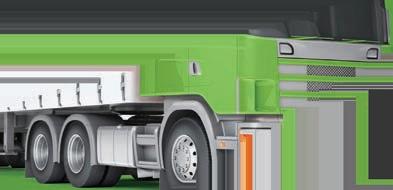






















































Shared ownership, shared success
Three decades on from its establishment, the UK’s orginal pallet network is planning for continued growth. Palletline Group MD Graham Leitch tells Steve Hobson why he believes the network’s member shareholding model is a key part of its success
Palletline was the first pallet network to be established in the UK and celebrated its 30th anniversary in 2022. That was also a year in which the business reached new heights with record volumes.
A planned programme of substantial investment has been designed to ensure Palletline has the right platform, capacity and structure in place to enable Group MD Graham Leitch, who took the helm in January 2015, to facilitate continued expansion and drive the business forward.

Whilst he appreciates there will be some challenges ahead, Leitch is confident about the future.
One of Palletline’s key strengths is its member shareholding model, which has been in place since 1994.
Leitch explained: “Palletline is the only network that is 100% owned by its members. The board has a strategy meeting every year and the first item on the agenda is always ‘is the ownership model right for the future?’ This is simply an example of good corporate governance, but in 2022 it resulted in rumours that Palletline’s shareholders were considering selling the business. On conclusion of the latest strategic review, the shareholders again ratified the ownership model as the optimum structure for the future of the business.
“The executive team does not hold shares – we are the custodians of the business with no vested interest.”
There are four executive directors on the Palletline board: Leitch; Paul Elson, MD of Palletline Logistics, which owns the nine transport companies the network has set up or acquired; Glenn Baker, network and operations director; and Michelle Roder, finance director.
In addition, there are seven shareholder directors who are elected by the members every three years.
“We meet once a month at the board meetings and the rest of the membership have that comfort that they are represented strongly on the board,” says Leitch. “Ken Hackling [owner of founder member John Hackling (Transport)] has been re-elected every three years for the past 30 years.”
The members’ shareholding varies from 0.5% to a maximum 5%, which ensures it is not possible for a small number of large shareholders to effectively control or force a sale of the network.
Investing from within
A number of the UK’s nine pallet networks have changed hands in recent years, with TPN being bought by Eddie Stobart parent GreenWhiteStar (now part of Culina Group), Palletforce being acquired by EV Cargo, DP World acquiring Palletways from Imperial, Pall-Ex being bought from founder Hilary Devey by members and management and then Fortec being taken over by Pall-Ex. ➜ 18
COULD PALLETLINE BECOME A BUYING GROUP?
While pallet network members often have strong ties with their local suppliers, offering them the opportunity to pool buying power is something the Palletline management constantly researches.
The network’s new five-year contract with Linde – which will see a new fleet of forklift trucks introduced across the business, 10 of which will be electric – is a deal that any member can take advantage of, for example.
“As much as anything, it is about sharing best practice more than putting together individual deals, as that can be quite difficult,” says Leitch.
This approach might become more important as zero-emissions vehicles start being introduced by members and the hubs could provide vital refuelling facilities. In his discussions with members, Leitch has come to the conclusion that their large, often double-deck trunkers will probably go hydrogen rather than battery electric.
“There is a big move to jump the electric phase and go straight to hydrogen for HGVs,” he says. “We have charging points for electric cars on site, but for trucks the infrastructure needs to be in place across the UK to meet the demand and there is not even sufficient grid capacity to cope with that at the moment.”
motortransport.co.uk Interview: Graham Leitch 16 MotorTransport 20.2.23
POSITIVE OUTLOOK: Palletline Group MD Graham Leitch is feeling confident about the future
















Following the review of ownership structure by Palletline members, the shareholders instead chose to support a £6m investment in the network.

“The current shareholders said ‘we will invest in Palletline, there is no need to go externally for investment,’ which I think is a very positive message,” says Leitch. “We believe that our current model is the only one that gives all our members a say in the business.
“Palletline is unique in that it is the only network where the shareholder members have control and that is very attractive to potential new members.”
FORKLIFT TRUCKS WILL WEIGH EVERY PALLET
A significant part of Palletline’s investment is in a new fleet of forklift trucks, which will have an advanced CCTV system. “We will further streamline the process, enabling us to immediately spot any damage to inbound pallets and see them travel through the hub,” says Leitch. “That will improve both quality control and health and safety.”
The new system combines cameras and barcode scanners which are linked to weighing equipment fitted to all the new lift trucks. This will enable Palletline to identity pallets that are lighter or heavier than the weight declared by the shipper.
“We will know the weight of every single pallet,” says Leitch. “We introduced a 750kg limit on unassisted tail lift deliveries in 2016 and we have that constantly under review. My view is that when the regulatory bodies did their review they should have stated a weight. If that was 750kg then great and if it was 500kg then we would conform to that.
“We are comfortable with 750kg together with all other live risk assessments that drivers do as pallets are delivered.”
If an overweight pallet is detected the inputting member will be informed that it needs to go on the network’s Lift Assist service, the extra cost of which is charged back to the inputter. The delivery member then gets that additional fee because it has the extra cost of using an electric pallet truck to make the delivery.
The top weight for Lift Assist using a tail lift is 1,000kg and the maximum weight the network will accept for delivery by forklift is 1,200kg.
“There is the option of member-to-member agreements for heavier pallets using special arrangements,” says Leitch. “We have the kit here to handle those by agreement.”
Heavy pallets foisted on members of other networks often come through central accounts sold by the hub – something that Palletline does not do.
“Central accounts are designed to drive volume through the centre and imbalance members, so they go out and sell volume for the benefit of venture capitalists or management teams,” says Leitch.
While Leitch doesn’t like to describe Palletline as a co-operative he says it is “co-operative-ish”.
“We are a family-style business owned by family transport companies that is run in a professional manner,” he explains. “Part of that strategy is that we have the lowest hub fees in the sector by quite a considerable margin.
“The investment will come partly from those hub fees, which will increase – though they will still be the lowest and best value in the sector. We own this building [the Birmingham hub] which is a £35m asset and are in a strong financial position.
“We also pay a very competitive inter-member rate so when you combine that with the hub fee, the overall cost of input is the lowest in the marketplace.”
This, Leitch argues, allows Palletline’s 78 members to invest in their own businesses, as evidenced by a delivery success rate above 98%.
It may be a cliché, but it remains true that a network is only as strong as its weakest link and many pallet network members complain that only the big inputters make money, while those in areas with more deliveries suffer. Leitch says that this is certainly not true at Palletline.
“Our strategy is to have the lowest hub fee, and delivery rates in the top quartile,” he says. “When you put those two together it still provides a competitive cost of input. Over the past few years, we have built up a business information unit and that has developed a cost-toserve model that we continually update.
“When we review our inter-member rates, we have millions of lines of data to show us what is the true costto-serve in each geographical area of the country. In 2022 we got Warwick University to externally verify our costto-serve model so we can say to the members we know we are paying the right delivery rates in each area.”
Looking to the future
A substantial part of the £6m investment is to fund the network’s ambitious expansion plans, though these are temporarily on hold as the UK teeters on the edge of recession. In the year to the end of June 2021 turnover increased by 19.4% to £179.4m, with volumes rising from 17,000 to more than 20,000 pallets per day.
This growth was fuelled by recovery in the manufacturing sector, as well as an increase in B2C volumes and
Interview: Graham Leitch 18 MotorTransport 20.2.23
AROUND THE CLOCK: With 56% next-day delivery, Palletline’s Birmingham hub handles 3,000 pallets during the day...
the company’s relationship with Amazon. Palletline is the only UK pallet network included in the ecommerce giant’s inbound preferred carrier programme, which saw a 52% volume increase between 2019 and 2021.
Palletline is based at its 234,000sq ft primary hub on 13.8 acres near Birmingham airport. A secondary 180,000sq ft hub that also has 28,000sq ft of canopy near Coventry airport was opened in 2018, mainly to service Amazon’s 22 UK fulfilment centres.

“We are expanding the Birmingham hub, including building a new shed which will add another 3,000 pallets to our capacity,” says Leitch. “We are timing the expansion based on volume growth and that growth has slowed.
“We were 10% behind 2021 in Q3 of 2022 – but that is still 5% ahead of 2019. We are ready to go when we need to expand, probably in early 2024.
“We are also investing in the Coventry site to extend the canopies so we can operate in the same way we do at Birmingham, which will increase our capacity by a further 3,000 pallets.”
Palletline operates three additional regional hubs across the UK, in north London, Glasgow and Haydock, having recently closed Leicester.
“Our multi-hub model is a key element of capacity management as we can flex them depending on volumes,” says Leitch. “We closed Leicester at the end of 2022 because volumes were flat.
“We are expecting another spike in volumes in 2024 and by then we will have invested the £6m in Birmingham and Coventry to cope with it. If volumes go exponential, as they did after the last recession, then we can open another hub – though it may not be in Leicester.
“We have modelled anticipated growth right through to 2030 and we know that with the investment, the capacity will be there by then.”
One way to increase hub capacity is to extend the hours it is used, though with a preponderance of next-day deliveries this can be a challenge.
“At the moment we are 56% next-day delivery. Our Birmingham site handles around 9,000 pallets a night and 3,000 during the day,” says Leitch. “Our commercial steering group is now looking at new services and alternative delivery options that would help in terms of capacity and maybe help members through the recession.” n
SOLVING THE PROBLEM OF SUCCESSION IN FAMILY HAULIERS
Palletline has 78 members with 96 depots across the UK, including nine hauliers it owns through its subsidiary Palletline Logistics. Palletline opened its first wholly owned depot in London in 2004, and now owns Ningbo Wrexham and Ningbo London, Mike Watson Transport, ABE Ledbury, S&S Distribution, Fast Forward Distribution, Palletline London, Palletline Whitehead and Palletline Northeast.
“We have strong confidence that the current membership will see us through this recession,” says Leitch. “But we have a contingency plan in place should a situation arise and we are unable to work through the difficult times with a member.”
Palletline’s risk-management strategy means there is a back-up plan for every member, which could include acquisition or asking other members to take on the relevant postcodes. The preferred option, of course, is to recruit a new member and Leitch says that the pipeline of hauliers wanting to join Palletline is still full.
“Our first option is not to buy it ourselves,” says Leitch. “We have bought some very good businesses over the past eight years, but not because we have had to buy them. They were bought to protect the integrity of the network and if they were ever sold again, we would need some form of protection.
“One of the issues in transport is the ageing profile of ownership of businesses. And that’s why three of the nine businesses were bought, because there was no new family coming through. The retiring owner felt the best option for their employees and their business was to sell to Palletline.
“But some of the members are on their second generation and others are handing over to a third generation.
“So, we’ve got some really strong businesses that have got very good internal succession plans, which is quite unusual in transport.”
Membership of more than one network is becoming increasingly common, partly because of the consolidation of small to medium size businesses, which can see hauliers that are already a network member acquire a firm established in another network. It also occurs because in remote parts of the country it is not commercially viable to have multiple hauliers delivering small volumes.
“Consolidation in the transport sector is a factor here and we have previously been successful in convincing acquirers of our members to join Palletline for their whole business. We have also recently worked with several of our members to reduce dual networking at Palletline,” says Leitch, “and whilst we recognise that it may be necessary within some of those difficult parts of the country, we believe our shareholder ownership model provides the strength to curtail this practice in the future.”
MotorTransport 19 motortransport.co.uk 20.2.23
...and 9,000 through the night





















































































































































































































































































































































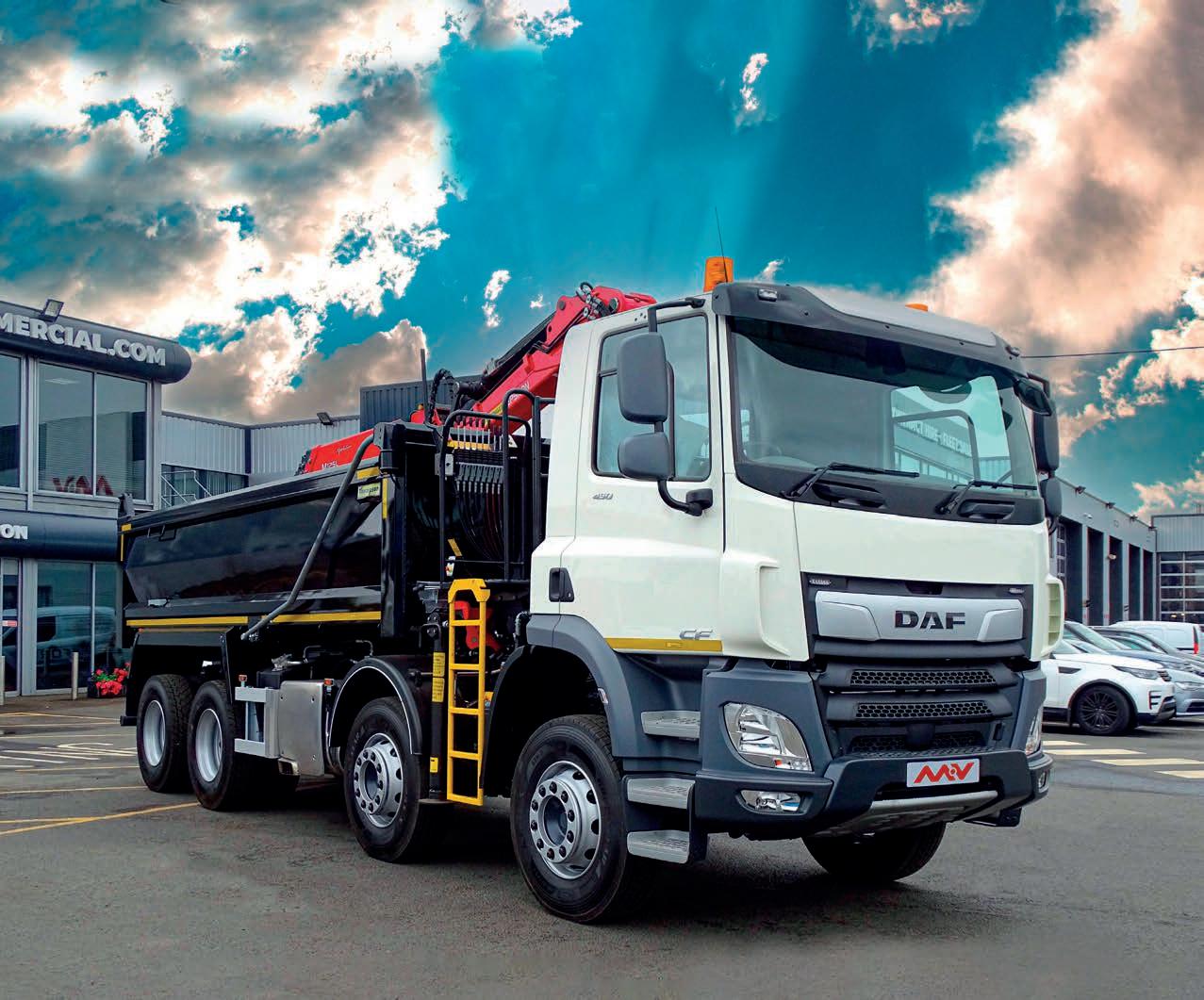






























 By Carol Millett
By Carol Millett

 Kjell Anderton, Fleet Focus
By Hayley Tayler
Kjell Anderton, Fleet Focus
By Hayley Tayler

















































































































































































































































































































































































